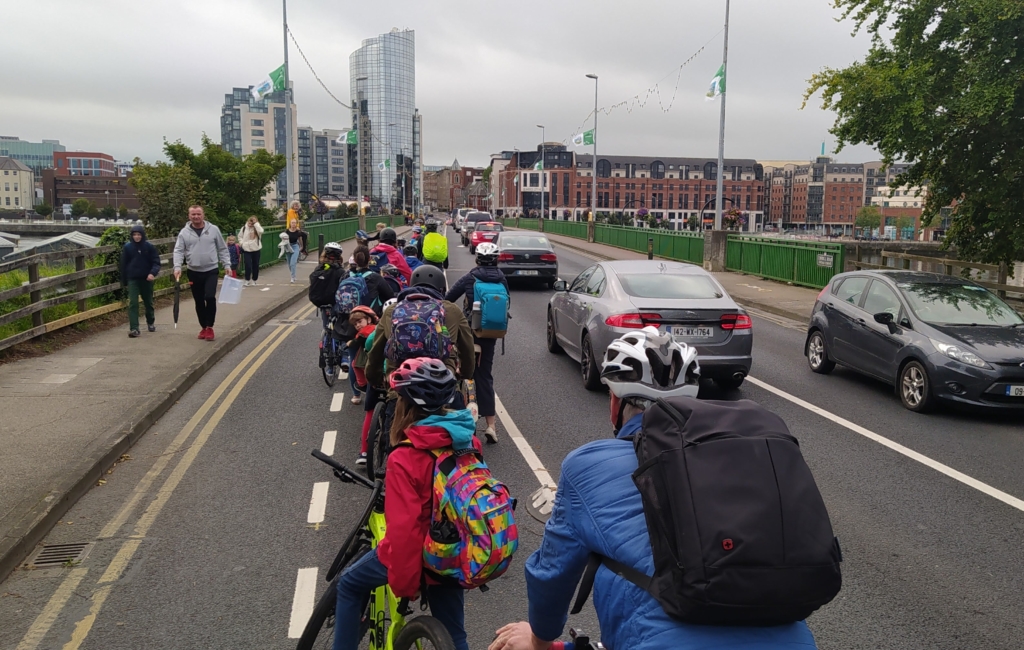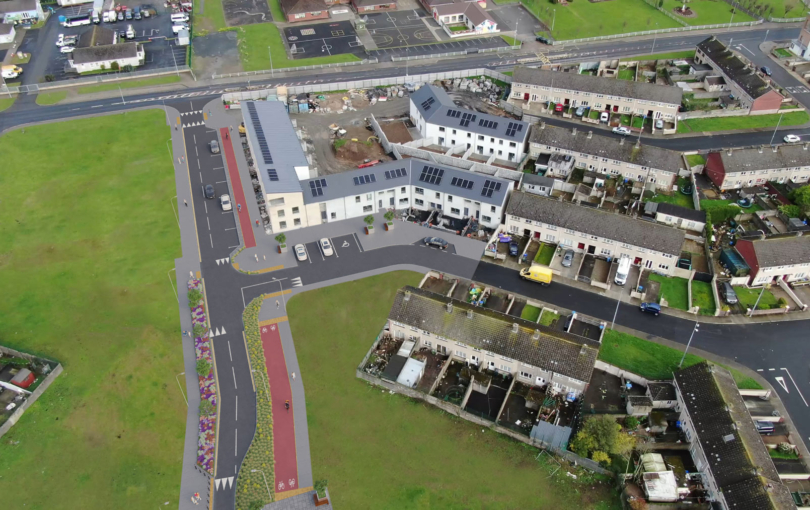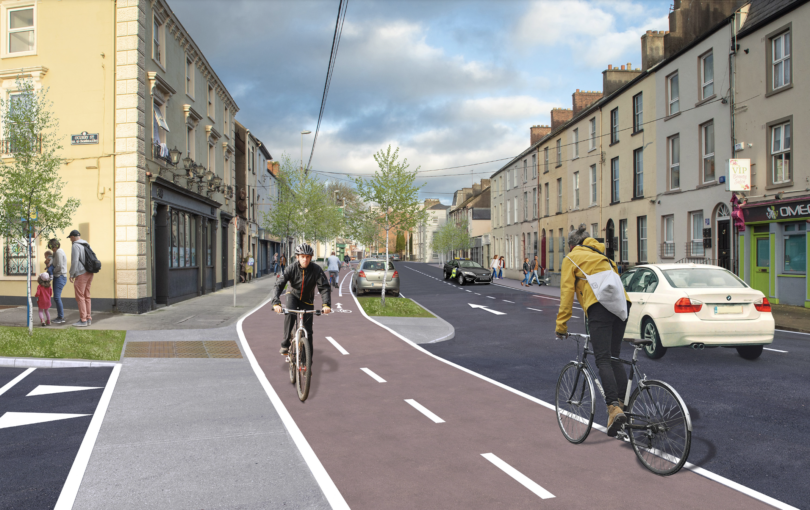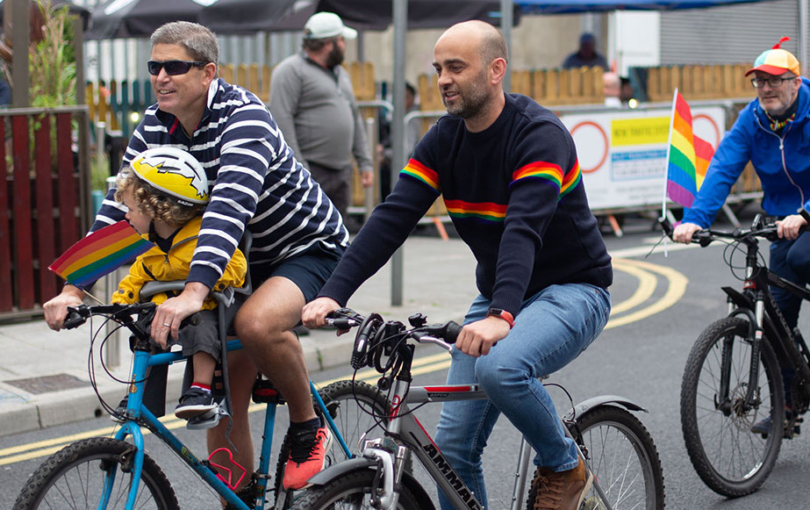Watch our interview with Larry de Cléir about Culture Change and cycling in Limerick.
The interview includes:
- Culture change – existing culture and what could be different
- Larry’s vision for Limerick which includes cycling for everyday life
- Successes in Limerick, particularly Shannon Bridge with a cycle path
- Positives for people cycling and walking in Limerick
- The right for people, especially school children, to cycle safely
- Be the change!
This chat is based on a talk that Larry gave at a public meeting of Limerick Cycling Campaign. The text for that talk is below.

Photo above: Limerick Cycle Bus on the cycle path on Shannon Bridge in September 2020, shortly after the path was put in place by Limerick County Council.
Larry’s talk on Culture Change
Limerick Cycling Campaign Public Meeting 25th Feb 2021 – Cultural Change – Larry de Cléir
This short talk describes the challenges in changing culture in respect of cycle usage in Limerick. Many thanks for allowing me a few minutes to share my thoughts.
Now culture means many things to many people (for example art, music, religion, ethnicity etc.). The definition that I will use (one of the many available if you look it up) is the characteristic features of everyday living shared by people in a place or time. We sometimes call this custom and practice.
One of our more important tasks, if we want people to cycle more, is to change the culture from a car-dependence to a multi-modal-independence. (Conor used the term multi-modal in his talk and I think that it is a good term to use to describe cycling, walking, buses, trains and indeed cars with park-and-ride). Perhaps our end-point is a point where cars will be modes of transport to be used rarely, instead of the first-choice going to work, or the first-choice ferrying children to school, or even the first-choice buying the paper on a sunny Sunday morning.
Culture tends to be very resilient and enduring, so the challenge of changing it is considerable. In the case of car usage, we are up against the oil industry, construction industry, iron and steel, rubber, glass, plastics/ceramics, even the mining industry and of course the motor industry itself. All those industries have almost unlimited resources to peddle the myth that, in the problem of moving people from place-to-place, the car is the solution!
I acknowledge that the last paragraph may be a little removed but I mention it because I think that we should acknowledge the effects of corporate marketing and lobbying. I’ll be coming back to it later.
In rainy Limerick the challenge of changing our culture away from car usage is that we are changing from comfort to discomfort, from convenience to inconvenience, from dry to wet, from warm to cold, from cosy to shivery, from safety to danger, from smelling nice to all sweaty, even perhaps from high status to somewhat lesser status!
When meeting these challenges, I believe that it helps to think about it as changing from:
The myth that the car is the solution
to
the reality that a multi-modal solution is potentially far better for us
Far better for our physical health, mental health, emotional wellbeing, the planet and our children. It gives us that feel-good factor we don’t get when we’re sitting in a traffic jam for ages with steamed-up windows and children shouting for attention as we see people walking faster than us! And it is massively cheaper for our Council.
And talking about the Council, a major part of our task is to get the ordinary people of Limerick to influence their Council, in other words, the legislators, to favour cycling, walking and taking buses over driving. Pressure from the grassroots is worth a lot more than pressure from campaigning groups, valuable and all as that is. The Cycle-Bus described so well by Bobby is a great example of a practical, grassroots activity that is easy to argue for – and works!
Grassroots is usually referred to as bottom-up. But what about the top-down. The culture of the legislators, the council, the civil service, the elected members. Generally, what we call the top-down culture in most countries is influenced by corporate values that come from lobbying by the industries that I mentioned above. This has been going on for a long time – in our case, sine the car was invented. Changing that culture is equally challenging.
Encouraging people to leave the car at home is predicated on the premise that the multi-modal alternative is well organised, reliable, comfortable and cheap; and seamlessly integrates public transport, cycling and of course, walking. Providing, and then implementing such a system is the responsibility of top-down!
Now I don’t have a ready-made, quick-fix solution or a plan to get every Limerick person mad about cycling. The first step (and I firmly believe this) in any campaign is to be the change and cycle ourselves, and I’d say that most of us do that anyway! But after that, I do think that a major promotion job is also required to change our culture. In undertaking this I think that it is important to remember that people gravitate to three things.
Firstly, success. We notice this with sport. When a team is losing people drift away, when they start winning, the terraces are full again. We do this because we project our own need to be successful onto the team.
Secondly, fun, or playfulness. We’re attracted to genuine playfulness (and I don’t mean sarcasm or mockery or cynicism) because even though from a very young age in school, work etc. we are conditioned to be serious our innate desire to be playful is still there. We find fun refreshing and attractive, and we want to be involved.
Thirdly, common sense. Because people see and experience so many decisions that don’t make sense it’s a breath of fresh air when they experience common sense.
I believe that these three factors, more than anything else, are attractive, generate a feel-good factor in us, and might have a substantial impact on changing culture, in our case, away from car dependence.
I propose that, post pandemic, they should be a major part of our cycling campaign from 2021 on!
There is another element to culture change that needs to be mentioned, I believe anyway, in any campaign. That is, the them and us culture that is endemic in society. I believe that resisting the urge to go along with them and us will yield far higher dividends in the long-term and see change as beneficial for all, those of us who want to cycle, walk, use public transport and business, restauranteurs, casual visitors, tourists, shoppers, and the Council itself.
Go raibh maith agaibh.
Larry de Cléir 25/2/21


